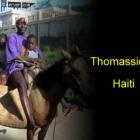ADVERTISEMENT
Health
The Health Category addresses all issues related to Health care in Haiti, starting with the availability of medical services for the Haitian population, where people can find health care in Haiti and also how to improve the system
What is Fear and what are the common Fears
Fear is one of the most common and most powerful kinds of emotion that every human being experiences at some point.
Fear is a mechanism or a response to a certain stimulus that could be associated to danger, horror, or pain.
The universal emotion of fear has two stages, first is a biochemical reaction and the second is an emotional reaction. A biochemical reaction usually involves several physical traits such as sweating, increased heartbeat, and adrenaline rush. During this stage, an individual undergoes a mental process of "fight or flight" where he or she prepares the body to react either by facing the situation like going in battle or to run away. An emotional reaction then happens, which is fear. This stage could determine the experience of fear as positive or negative. Extreme sports and horror films usually have a positive bearing to fear, but most fearful experiences are often dealt with and perceived negatively such as accidents.
What happens when someone has no Fear
Despite fear being universal in all human beings, some individuals could actually lack the sense of fear in a given situation.
Yes, fear is beneficial in identifying danger and preparing for it, but what if one does not feel fear despite the danger?
The absence of fear is characterized by one's neglect of any risks that could happen when faced with a dangerous situation. This is solely situational of course, depending on the individual and the factors at hand. When it comes to motherly instinct in animals for example, a mother fearlessly fights off a predator much bigger and stronger than she is when the life of her offspring is threatened. This is also the case for human beings when children are involved.
Three Important Questions Pregnant Mothers seek answers from
Abortion is an important issue in the society. This is the case because it touches on human life and at the same time, it affects the issue of morality in the society. This is the reason this issue will continue to raise controversy among the different stakeholders. Because of the sacredness of life attached to life, it is not possible to avoid seeking answers to some very important questions as far as abortion is concerned. The 3 important questions for abortion clinics are under discussion as below.
The first issue about abortion touches on the safety of the practice. How such safe is abortion? It is important to note that no person is ready and willing to undertake a medical or surgical practice without first analyzing the risks associated with practice. Doing so will be lack of prudence and it is unacceptable.
Health, Medical, and Environmental Risk Factors of Cholera
Cholera, a severe bacterial infection, affects the intestines, causing bouts of watery diarrhea, heaving, circulatory distress, and shock. Anyone can contract cholera, the exception being nursing infants. But there are particular contributors that can predispose people to the illness:
Malnutrition. People who are starving have a propensity to catching cholera. The illness takes hold in places where survivors of war or natural disasters live. Or in communities that suffer famine.
Low levels of stomach acid. Inadequate levels of stomach acid create an environment for cholera bacteria to flourish in. Age groups that have low-acidity markers are children and aged people. Gastric surgery survivors and antacid takers, suffering from ulcers, are also prone to getting cholera.
Cholera Symptoms and Signs
Cholera, a potentially fatal disease in some cases affects the intestinal tract. Some forms of cholera are symptom-less, or exhibit only moderate signs of the illness. The onset of cholera symptoms happens within a 24- to 48-hour period. Typical signs of having contracted cholera include diarrhea, vomiting, and muscle cramps. In moderate cases, normally healthy people experience spontaneous and extreme amounts of watery diarrhea between one and five days of consuming food containing the Vibrio cholerae bacterium.
In extreme cases of cholera, which afflicts one out of twenty people, diarrhea is accompanied by vomiting and muscle cramps. These symptoms come on quickly, and excessive loss of body fluids caused by diarrhea will bring on dehydration. Dehydration may lead to shock. If this extreme form of cholera is left untreated, a person can die within a few short hours.
How to prevent Cholera in Haiti
Haiti's 2010 earthquake, which shook the country to its foundations, especially Port-au-Prince, displaced tens of thousands of Haitians. They were reduced to living in the streets, without adequate sanitation. Nine months later in October of 2010, a cholera epidemic began, and has continued afflicting the poorest segment of Haitians, many of whom remain living in tent cities.
The Ministry of Public Sanitation and the Population has recorded 581,952 cases of cholera as of July 2012, with a 7,455 death tally since October 2010. A noticeable rise in cholera cases have been reported since early 2012 in Centre, Nord, and Port-au-Prince. Port-au-Prince neighborhoods reporting cases of cholera include: Carrefour, Cité Soleil, Delmas, Kenscoff, Petionville, and Tabarre.
Cholera Prevention Tips when in Public places in Haiti
In order to reduce the likelihood of a renewed outbreak of cholera. For the general population, the basics of cholera prevention are re-emphasized:
• use soap and water to disinfect hands before preparation of food, and during the consumption of it.
• disinfect plates, glasses, forks, knives, and spoons with hot water.
• disinfect hands after using toilet facilities.
• boil or disinfect possibly contaminated water.
• use disinfected water only for household tasks.
Because many poorer Haitians don't understand good sanitation habits, the Ministry of Health issues a stern warning to avoid defecating on the ground. And to also avoid defecation near bodies of water, natural or man-made.
What we pay for our Fears
They steal, rape, kidnap, and kill their way into many people's fears. Aside from these threatening uninvited visitors, the ordinary household could turn into a danger zone because of the simplest of objects and areas. Knives, loose electric wires, flights of stairs, and even a banana peel could prove to be very fatal.
Fear dominates the existence of the human race. That is why some businesses try to make money out of it. Billions of dollars are spent on products and services that supposedly ensure the safety and well-being of an individual. This is what people pay for the sake making their fears come true, but to what extent?
Unveiling the Thin Link between Abortion and Breast Cancer
The issue of abortion causing or being the effect of breast cancer has been highly politicized. This is the case because no scientific research has been conducted to confirm the close connection between the two. In light of these facts, the section that follows is dedicated to show the possibility of the linkage between the two issues.
Cancer occurs because of the overgrowing of the tissues of a particular organ. This means that the abnormal growth of the cells of organs under observation makes the organ form cramps. It actually forms a tumor on the body part. Every part of the body is susceptible to abnormal outgrowths and breasts are not exceptions. If the growth happens to the breast then what follows is breast cancer.
The Pathology of Antisocial Behavior
People who engage in acting-out behaviors such as hostility, physical attacks, harassment, torture of people or animals, chronic lying, destruction of property, and theft are suffering from a conduct disorder.
According to researchers, such persons are immune to pain or physical threats and the restraints of a lawful society. Because of their immunity to threats, physical pain, and the consequences of their actions, they feel free to inflict mental, emotional, and physical injuries on others.
If these antisocial behaviors continue into adulthood, the odds are an antisocial personality disorder (APD) has formed. APD bears resemblance to another type of destructive behavior disorder, sociopathic or psychopathic personality disorder. Research surveys indicate 1% of females and 3% of males suffer from a version of APD.
Our objective is to share with you news and information about Haiti and the people of Haiti. Traditions, habits and the way we were or grew are alive in this site. We highly recommend that you Subscribe to our Newsletter and also share with us some of the things that are memorable and made us unique people.

 The Town of Savanette, Haiti
The Town of Savanette, Haiti  Thomassique, Haiti
Thomassique, Haiti  Verrettes, Haiti
Verrettes, Haiti  Haiti tech Summit
Haiti tech Summit  Haitian Thanksgiving
Haitian Thanksgiving